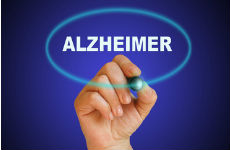How to Recognize the Early Warning Signs of Alzheimer’s Disease
- Details
- Published on Wednesday, 24 December 2014 18:14
 If you spent time with a senior loved one over the holidays, your visit may have raised a few concerns. Some behaviors and changes in an aging family member may make you worry that they are developing Alzheimer’s disease. While there are conditions such as a vitamin B12 deficiency or an infection that can mimic dementia, knowing the warning signs that might suggest Alzheimer’s is important.
If you spent time with a senior loved one over the holidays, your visit may have raised a few concerns. Some behaviors and changes in an aging family member may make you worry that they are developing Alzheimer’s disease. While there are conditions such as a vitamin B12 deficiency or an infection that can mimic dementia, knowing the warning signs that might suggest Alzheimer’s is important.
Early Alzheimer’s Warning Signs
According to the experts at the Alzheimer’s Association, there are ten warning signs to look for. They include:
- Memory loss that disrupts their daily life. Are they forgetting recently learned things or asking you to repeat yourself over and over? Do you notice they need more prompts and reminders to help stay on track?
- Difficulty completing familiar tasks. It might be with performing chores around the house that they have always done or with their favorite hobbies such as painting or playing cards.
- Struggling with planning or problem solving. Do they seem to have trouble with activities or tasks that rely on their abstract thought process and memory? Examples might include trouble following a recipe, using a credit card at the gas pump, or writing out a grocery list.
- Do they seem to be having trouble with tasks that require visual recognition or perception? It might be problems with reading or with judging distance.
- Changes in mood or personality. Are they more easily upset than is typical for them? Are they overly suspicious of people or becoming paranoid that someone is trying to steal from them?
- Does your loved one misplace things? Are they able to retrace their steps to find the lost item or are they unable to remember where they’ve been? It isn’t unusual to misplace things, but not being able to revisit the stops you’ve made to find it can be a warning sign that something else is wrong.
- Withdrawing from hobbies, interests, and friendships. If your loved one seems to be avoiding social contact with others, they may be doing so because they know something is wrong.
- Problems with written or verbal communication. For many families, this is one of the concerns they notice first. It might be a parent who lives far away who has written them a letter every week suddenly stops writing, or their letters have become difficult to understand. They might also have trouble holding up their end of a conversation.
- Change in judgment can also raise a red flag. If an always frugal senior loved one is spending money frivolously or no longer making good decisions on important matters, it can be a signal of early Alzheimer’s.
- Confusion over time and place. For most people, this is the symptom they are most familiar with when they think of Alzheimer’s disease. If a loved one gets lost on their way home from a familiar place or can’t remember what day it is, their physician will probably want to investigate further.
If your senior family member is exhibiting a few of these warning signs, it is probably time to schedule an appointment with their physician. Keep in mind it might be a condition other than Alzheimer’s that is treatable with early intervention.

